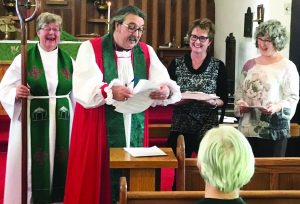Saskatoon’s first Indigenous Anglican bishop hopes to bridge two worlds. Chris Harper didn’t believe he would ever live to see the day an Indigenous person became bishop in Saskatoon. He’s now living that reality.
Harper, or officially, The Rt. Rev. Chris Harper, was consecrated as bishop of the Anglican Diocese of Saskatoon on November 17, 2018, becoming the 13th bishop and first Indigenous leader of the diocese.
Harper’s vision as bishop, he said, is appropriate to the city he serves. He’s trying to build bridges.
“I’m trying to bring two broken worlds back through a bridge of healing. The church, the Indigenous. The cultural and the historical,” Harper said. “I want to strive towards reconciliation, towards peace building, towards enrichment and enabling those who may have felt their ministries or churches were not heard.”
Harper, from Onion Lake First Nation, grew up living both on and off reserves across Saskatchewan and Alberta. Despite being tagged “Saint Christopher” by family and friends due to his discipline and commitment to helping those in need, Harper had anything but a direct route to ministry. His work was diverse, including working as a gas jockey, emergency medical technician and restauranteur before studying theology and entering into priesthood in 2005.
“I tried everything in life. I think anyone who preaches about sin needs to understand what sin is. I’m a full human being. All the experiences I’ve gone through led me to this.”
He recalled, while in seminary, being profoundly moved while witnessing a smudging in a Catholic Church—a harmony between both culture and faith.
“When I saw that, I cried. I never thought I would live long enough to see that in my lifetime—an Indigenous expression of faith inside a church,” he said.

Harper served as Indigenous Native Priest in the Diocese of Toronto before returning to ministry in Saskatoon, where he was elected bishop from a list of six candidates.
During his consecration in November, attended by bishops from around Canada, Harper imbued the ceremony with this same type of harmony, augmenting the ceremony for traditional rites for ordaining a bishop with Cree tradition, including smudging.
“For a lot of bishops, they had never experienced that,” said Harper. “This is, in a sense, what I do. I’m shaking up the conventional expectations and thought of what they see as the church and what they see as long-standing historical practice within one body.”
Harper’s resounding message in his ministry is one of unity and healing. He said society has become more divided, and hopes he can help dissolve those divisions.
“Society has become more polarized. We give these labels to try to define ourselves and exclude ourselves or others from the commonalities, the things we share as human beings,” he said.
“(As Indigenous), I become an opportunity, or vehicle, of healing for both the church—because the legacy of the church as a participant with residential schools—and a representative of Indigenous people themselves. Both sides, the church and Indigenous people, need to step onto the bridge of healing.”
The Anglican Church had officially apologized for their involvement in residential schools in 1993. The Roman Catholic Church, who seek “ways that can foster the desired process of healing and reconciliation”, has yet to issue an apology, to the criticism of many who await their apology.
Harper said he does not have the right to speak on what any leadership should do. “It would be wrong of me to say ‘this has to be done.’ If anything, the Spirit shoulds peak to us all of what is right,” he said.
Harper believes that true reconciliation does not come through monetary gestures, but from understanding. “Reconciliation is more than an apology, more than words and words alone. Even with the financial settlements that were given, that was not true reconciliation. That’s the consumerist way to pay for a wrong done,” he said.
“Faith asks you to take something in reconciliation and walk together in peace and healing.”
Harper said his goal over the next year, as newly elected bishop, is to visit and make connections with all the churches in the diocese. He said his challenge as a bishop is striving to walk with all people, making the church a welcoming and integral part of the community.
And as the 13th bishop, he uses the number to lightheartedly make a connection to his role as bishop. “As the 13th bishop, I see connections with the (Saskatchewan Roughriders) ‘13th Man,’” Harper smiled.
“It was once seen as detrimental, but rallied people together. We need to believe in each other… if I can be some sort of change, I pray that I can use that as a symbol so we can walk together, worship together and serve together. So, we can be one again in the family of God our Creator.”—NC Raine